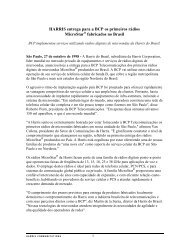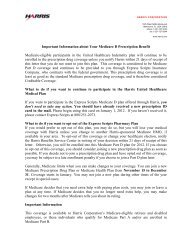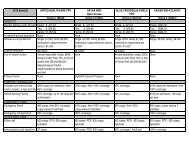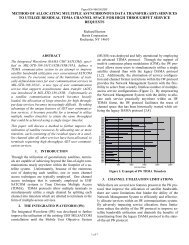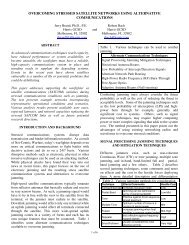harris corporation
harris corporation
harris corporation
You also want an ePaper? Increase the reach of your titles
YUMPU automatically turns print PDFs into web optimized ePapers that Google loves.
We could be negatively impacted by a security breach, through cyber attack, cyber intrusion or otherwise, or<br />
other significant disruption of our IT networks and related systems or of those we operate for certain of our<br />
customers.<br />
We face the risk, as does any company, of a security breach, whether through cyber attack or cyber intrusion<br />
over the Internet, malware, computer viruses, attachments to e-mails, persons inside our organization or persons<br />
with access to systems inside our organization, or other significant disruption of our IT networks and related<br />
systems. We face an added risk of a security breach or other significant disruption of the IT networks and related<br />
systems that we develop, install, operate and maintain for certain of our customers, which may involve managing<br />
and protecting information relating to national security and other sensitive government functions. The risk of a<br />
security breach or disruption, particularly through cyber attack or cyber intrusion, including by computer hackers,<br />
foreign governments and cyber terrorists, has increased as the number, intensity and sophistication of attempted<br />
attacks and intrusions from around the world have increased. As a communications and IT company, and<br />
particularly as a government contractor, we face a heightened risk of a security breach or disruption from threats to<br />
gain unauthorized access to our and our customers’ proprietary or classified information on our IT networks and<br />
related systems and to the IT networks and related systems that we operate and maintain for certain of our<br />
customers. These types of information and IT networks and related systems are critical to the operation of our<br />
business and essential to our ability to perform day-to-day operations, and, in some cases, are critical to the<br />
operations of certain of our customers. Although we make significant efforts to maintain the security and integrity<br />
of these types of information and IT networks and related systems, and we have implemented various measures to<br />
manage the risk of a security breach or disruption, there can be no assurance that our security efforts and measures<br />
will be effective or that attempted security breaches or disruptions would not be successful or damaging. Even the<br />
most well protected information, networks, systems and facilities remain potentially vulnerable because attempted<br />
security breaches, particularly cyber attacks and intrusions, or disruptions will occur in the future, and because the<br />
techniques used in such attempts are constantly evolving and generally are not recognized until launched against a<br />
target, and in some cases are designed not be detected and, in fact, may not be detected. In some cases, the<br />
resources of foreign governments may be behind such attacks. Accordingly, we may be unable to anticipate these<br />
techniques or to implement adequate security barriers or other preventative measures, and thus it is virtually<br />
impossible for us to entirely mitigate this risk. A security breach or other significant disruption involving these types<br />
of information and IT networks and related systems could:<br />
• Disrupt the proper functioning of these networks and systems and therefore our operations and/or those of<br />
certain of our customers;<br />
• Result in the unauthorized access to, and destruction, loss, theft, misappropriation or release of proprietary,<br />
confidential, sensitive or otherwise valuable information of ours or our customers, including trade secrets,<br />
which others could use to compete against us or for disruptive, destructive or otherwise harmful purposes and<br />
outcomes;<br />
• Compromise national security and other sensitive government functions;<br />
• Require significant management attention and resources to remedy the damages that result;<br />
• Subject us to claims for contract breach, damages, credits, penalties or termination; or<br />
• Damage our reputation among our customers (particularly agencies of the U.S. Government and potential<br />
customers of Cyber Integrated Solutions) and the public generally,<br />
Any or all of which could have a negative impact on our results of operations, financial condition and cash<br />
flows.<br />
We derive a significant portion of our revenue from international operations and are subject to the risks of doing<br />
business internationally, including fluctuations in currency exchange rates.<br />
We are dependent on sales to customers outside the United States. In fiscal 2011, fiscal 2010 and fiscal 2009,<br />
revenue from products and services exported from the U.S. or manufactured or rendered abroad was 22 percent,<br />
14 percent and 20 percent, respectively, of our total revenue. Approximately 33 percent of our international business<br />
in fiscal 2011 was transacted in local currency. Losses resulting from currency rate fluctuations can adversely affect<br />
our results. We expect that international revenue will continue to account for a significant portion of our total<br />
revenue. Also, a significant portion of our international revenue is from, and an increasing portion of our business<br />
activity is being conducted in, less-developed countries. We are subject to risks of doing business internationally,<br />
including:<br />
• Currency exchange controls, fluctuations of currency and currency revaluations;<br />
• The laws, regulations and policies of foreign governments relating to investments and operations, as well as<br />
U.S. laws affecting the activities of U.S. companies abroad, including the Foreign Corrupt Practices Act;<br />
20




